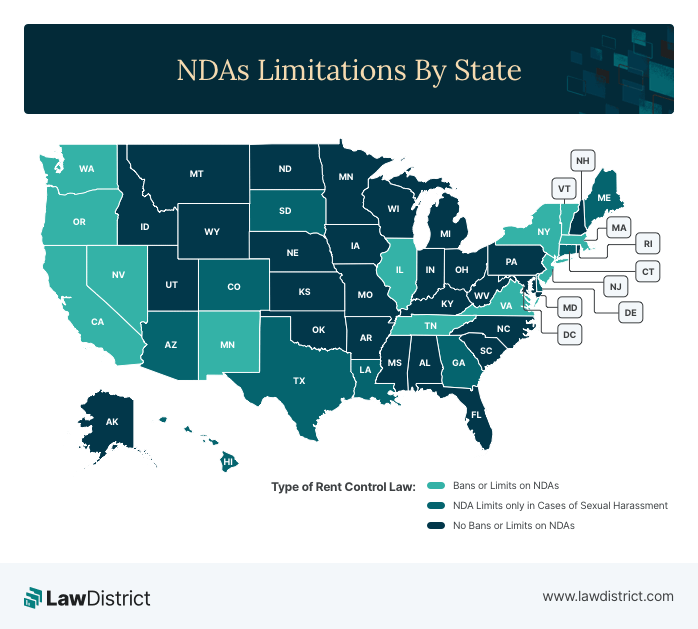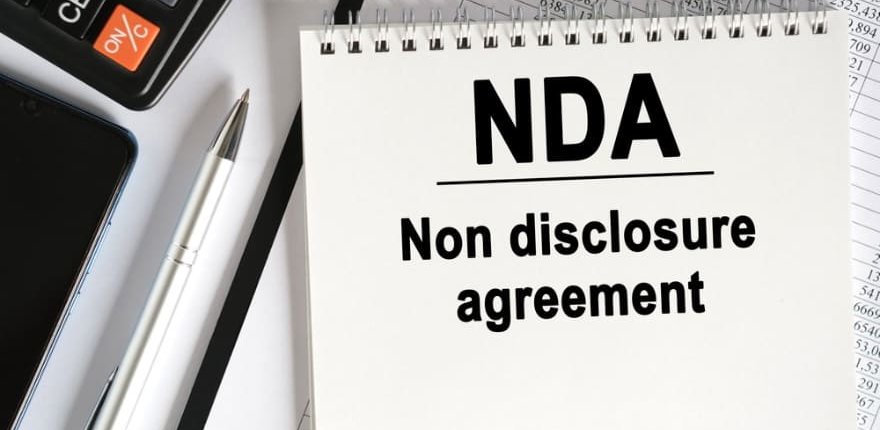Non-disclosure agreements (NDAs) or clauses prevent workers from disclosing specific information about their employers and workplaces. Non-disclosure agreements are widely used: recent data suggest that over one-third of US workers are bound by one.
To protect trade secrets, companies traditionally use non-disclosure agreements. During the 1980s, non-disclosure agreements expanded to prevent workers from discussing workplace issues, including:
- Harassment
- Discrimination
- Violations of workers' rights in other areas
Employees who sign legally binding non-disparagement agreements are prohibited from publicly criticizing their employer or disclosing any negative information about them, no matter how true those facts are. Employees typically sign NDAs that restrict them from disclosing violations of their rights in two situations:
- Policy recommendations that may be imposed at the time of hire, or after hire, as a condition of continued employment ("pre-dispute")
- After a worker experiences harassment, discrimination, or some other violation of workplace rights, they can be incorporated into a settlement, separation, or severance agreement ("post-dispute")
Following the #MeToo movement, it has become clear that individual stories can bring about change. To counteract NDAs, policymakers should prohibit employers from requiring individuals to sign NDAs and limit NDAs used in settlement, separation, and severance contracts.
Restricting Use of Non-Disclosure Agreements
Employers often ask new employees to sign a non-disclosure agreement (NDA) to protect intellectual property. A non-competition clause can also be included to prevent employees from taking on too similar a job upon leaving.
A business's ability to create value has changed, resulting in a growth in use. Especially with technology companies, whose products and services require time to bring to market and therefore have little revenue, much of the valuation of the business is determined by intellectual property.
NDAs do not guarantee idea protection. If the claimant requests a non-disclosure agreement to keep their idea confidential, some laws may allow the use of non-disclosure agreements.
Non-Disclosure Agreement Laws by State

| State
|
Non-Disclosure Agreement Law
|
| Alabama
|
Businesses Can Protect Their Proprietary Information Under Title 8, Chapter 27 (Alabama Trade Secrets Act)
|
| Alaska
|
Section 25 Of Title 9 Of The Alaska Statutes 2021. Privileges, Evidence, And Presumptions Article 4. Self-Audit Privileges And Immunities. Sec. 09.25.455. Disclosure And Waiver
|
| Arizona
|
Under Title 44, Chapter 4 (Uniform Trade Secrets Act), Truly Confidential Information Could Include Customer Lists, Financial Information, And Strategic Plans
|
| Arkansas
|
Title 23 Of The Arkansas Code Contains Chapter 63 - Insurance Companies And Subchapter 19 - Property And Casualty Actuarial Opinion Law 23-63-1905. Confidentiality
|
| California
|
2016 California Code - CCP Part 2 - Of Civil Actions Title 14 - Of Miscellaneous Provisions Chapter 3.5. Confidential Settlement Agreements Section 1002
|
| Colorado
|
2018 Colorado Revised Statutes Title 7 -
Article 64 - Colorado Uniform Partnership Act (1997) Part 1 - General Provisions. Statute Of Frauds And The Effect Of Partnership Agreements
|
| Connecticut
|
2018 Connecticut General Statutes Title 1 - Provisions Of General Application Chapter 14* - Freedom Of Information Act
|
| Delaware
|
2018 Delaware Code Title 7 - Conservation Chapter 91. Delaware Hazardous Substance Cleanup Act Subchapter I General Provisions And Enforcement § 9116. Confidentiality Of Proprietary Information
|
| Florida
|
The 2022 Florida Statutes Confidentiality Of Records - Under Florida Statute Section 542.335(B)2), Trade Secrets
|
| Georgia
|
2018 Georgia Code Title 50 - Chapter 18 - State Printing And Documents Article 4 - Inspection Of Public Records § 50-18-72
|
| Hawaii
|
2021 Hawaii Revised Statutes Title 26. Trade Regulation And Practice 482b. Trade Secrets
|
| Idaho
|
2015 Idaho Statutes Title 74 - Transparent And Ethical Government Chapter 1 - Public Records Act Section 74-107 - Records Exempt From Disclosure -- Trade Secrets, Production Records, Appraisals, Bids, Proprietary Information
|
| Illinois
|
2017 Illinois Compiled Statutes Chapter 765 - Property
765 1026/ - Revised Uniform Unclaimed Property Act.
Article 14 - Confidentiality And Security Of Information
|
| Indiana
|
329 Ind. Admin. Code 6.1-9-1
|
| Iowa
|
2017 Iowa Code Title xiii - Commerce Chapter 550 - Trade Secrets
|
| Kansas
|
KSA §§ 60-3320 Through 60-3330 (2011)
|
| Kentucky
|
Kentucky's Trade Secrets Act, Ky Rev Stat §§ 365.880 Through 365.993
|
| Louisiana
|
Chapter 13-A. Uniform Trade Secrets Act
|
| Maine
|
Sec. 1. 26 MRSA C. 7, Sub-C. 3-B - An Act Concerning Non-Disclosure Agreements in Employment
|
| Maryland
|
Subtitle 12 - Maryland Uniform Trade Secrets Act
|
| Massachusetts
|
Mass. Gen. Laws Ann. Ch. 93, §§ 42 – 42g - Trade Secrets; Definitions Applicable to Secs. 42 To 42g
|
| Michigan
|
Confidential Research and Investment Information Act (Excerpt) Act 55 Of 1994
|
| Minnesota
|
2022 Minnesota Statutes - Chapter 325c. Uniform Trade Secrets Act
|
| Mississippi
|
Mississippi Uniform Trade Secrets Act (§§ 75-26-1 — 75-26-19)
|
| Missouri
|
Mo Rev Stat §§ 417.450 Through 417.467
|
| Montana
|
38.2.5012 Nondisclosure Agreements--General
|
| Nebraska
|
Neb. Rev. Stat. §§ 87-501 Through 87-507
|
| Nevada
|
Chapter 600a - Trade Secrets (Uniform Act)
|
| New Hampshire
|
350-B: Uniform Trade Secrets Act
|
| New Jersey
|
N.J. Rev. Stat. §§ 56-15-1 Through 56-15-9
|
| New Mexico
|
2021 New Mexico Statutes Chapter 50 - Employment Law
Article 4 - Labor Conditions; Payment Of Wages Section 50-4-36 - Workplace Sexual Harassment, Discrimination, And Retaliation Claims; Nondisclosure Agreements And Certain Actions Prohibited.
|
| New York
|
5-336 - Non-disclosure Agreements, Stop Silencing Survivors Act
|
| North Carolina
|
Nc Gen Stat §§ 66-152 Through 66-157
|
| North Dakota
|
N.D. Cent. Code §47-25.1
|
| Ohio
|
Ohio. Rev. Code §§ 1333.61 Through 1333.69 -Section 1333.61 | Uniform Trade Secrets Act Definitions
|
| Oklahoma
|
21 OS § 21-1732, Is Modeled On The Uniform Trade Secrets Act
|
| Oregon
|
Uniform Trade Secrets Act, Ors 646.461 Through 646.475
|
| Pennsylvania
|
Uniform Trade Secrets Act. 12 Pa Cons Stat §§ 5301 Through 5308
|
| Rhode Island
|
Uniform Trade Secrets Act, R.I. Gen Laws. §§ 6-41-1 Through 6-41-11 Sets Forth The Laws That Affect Non-Disclosure Agreements
|
| South Carolina
|
Trade Secrets Act, Sc Code §§ 39-8-10 Through 39-8-130
|
| South Dakota
|
Uniform Trade Secrets Act, Sd Codified L §§ 37-29-1 Through 37-29-11
|
| Tennessee
|
2021 Tennessee Code Title 50 - Employers and Employees
Chapter 1 – Practices and Employment Relationship Part 1 - Hiring Practices § 50-1-108. Non-Disclosure Agreement For Sexual Harassment In Workplace As Condition Of Employment Prohibited
|
| Texas
|
Trade Secrets Act, Tex. Bus. and Com. Code §§ 134a.001 Through 134a.008, Regulates The Use Of Non-Disclosure Agreements
|
| Utah
|
Utah Code §§ 13-24-1 Through 13-24-9, Uniform Trade Secrets Act
|
| Vermont
|
Trade Secrets And Non-Disclosure Agreements 9 VSA §§ 4601 Through 4609
|
| Virginia
|
§ 40.1-28.01. Non-disclosure Or Confidentiality Agreement; Provisions Regarding Sexual Assault; Condition Of Employment.
|
| Washington
|
Adopted The Uniform Trade Secrets Act, RCW §§ 19.108.010 Through 19.108.930, Washington Silenced No More Act
|
| Washington Dc
|
Chapter 4. Trade Secrets - Dc Code §§ 36-401 – 36-410
|
| West Virginia
|
Uniform Trade Secrets Act, Wv Code §§ 47-22-1 Through 47-22-10
|
| Wisconsin
|
Uniform Trade Secrets Act, Wis. Stat. Ann. §§ 134.90 Through 134.90(7)
|
| Wyoming
|
Uniform Trade Secrets Act, Wy Stat §§ 40-24-101 Through 40-24-110
|
Ban On Non-Disclosure Agreements for Worker Protection
In the post-dispute context, some workers' advocates warn that banning NDAs completely could have unintended negative consequences for those harassed at work. Discrimination and harassment victims may wish to maintain confidentiality about information related to:
- Their claims and identities
- For privacy
- Disputes at work could affect future employment
- Disparaging remarks from their employer harm their careers
No state has completely banned NDAs post-dispute to date. In many states, however, the victim can determine whether to sign an NDA or not. A policy should include elements that shift power imbalances, prevent workers from being coerced into signing a non-disclosure agreement, and limit the abusive scope of NDAs.
In addition to bringing much-needed transparency to worker rights violations, limiting the use of NDAs will empower victims and hold harassers and employers accountable. Make sure that your NDAs follow the rules required in your state.
Start your Non-Disclosure Agreement now
Sources:
Cornell Law - Nondisclosure Agreement
Spectrum - U.S. Senate passes bill limiting NDAs
The Washington Post - What happens when states limit nondisclosure agreements?



